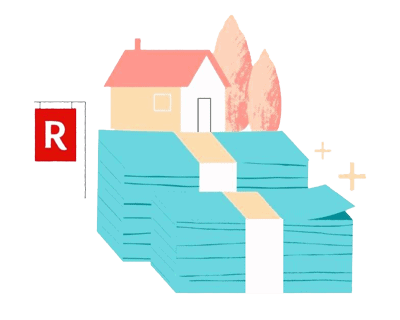
When it comes to buying a home , a lot of important paperwork needs to be completed before you can call a house yours. One of these important pieces of paperwork is the purchase and sale agreement.
To help you navigate this document, we’ll go over what a purchase and sale agreement is, what it includes, and what happens after. So whether you’re selling a home in Boston, MA, or buying a home in Dallas, TX , read on to learn more about what goes into a purchase and sale agreement during a real estate transaction.

A purchase and sale agreement, also known as a PSA or P&S for short, is the document received after mutual acceptance of an offer. It states the final sale price and all terms of the purchase in a real estate transaction. A PSA can vary by state. They typically consist of the final sale price, earnest money details, closing date, title information, and contingencies. Timelines for inspections, securing financing, and the closing date, along with any other deadlines and anything else the buyer/seller requests, will be detailed in the agreement.


The purchase and sale agreement may sound similar to the purchase agreement, but they are not the same.
Purchase and Sale Agreement (PSA): This document outlines the specific terms and conditions agreed upon by the buyer and seller. It includes details such as the final sale price, earnest money, timelines for inspections and financing, contingencies, and closing date. Both parties sign the PSA to indicate their mutual acceptance of these terms.
Purchase Agreement: This is the final paperwork that both parties sign to complete the sale of the home. After all the terms outlined in the PSA have been met, the purchase agreement is signed, finalizing the transaction.
The specific items in this contract vary by state, but will almost always include the following:
The PSA will include the purchase price agreed upon by the buyer and seller.. Note that this price might change during negotiations before the closing date. For instance, if the buyer’s home inspection turns up a problem with the home, the buyer may be able to negotiate a reduced purchase price.
The purchase and sale agreement will include information on the earnest money deposit, such as the dollar amount and instructions for making the deposit. In most areas, the buyer will need to deposit a personal or cashier’s check which is held with a neutral third party. These third-party companies can be escrow companies, title companies, or law firms. They will need to deposit within one to three days of mutual acceptance.
The closing date will be included in the purchase and sale agreement (PSA). On this date, the transfer of property is recorded with the local government, and the seller receives payment for the home. While the closing date is specified in the PSA, it may change due to unforeseen events, such as delays in financial paperwork.
Information about your title company will be included in the purchase and sale agreement. As the buyer, you always have the right to select a title company. You should talk to your agent or attorney if you have any questions about choosing a title company.
The purchase and sale agreement will include an agreement that the seller will provide a clear or marketable title of ownership to the buyer.
Contingencies are conditions that must be met in order for the home purchase to be completed. A buyer or seller may cancel a sale if one of the contingencies can’t be met. Here are some examples of common contingencies .
Either the buyer’s agent or the real estate attorney will draft up the contract. This depends on what state the home resides in. In states where escrow agents handle the closing process, the buyer’s agent is responsible for preparing the PSA document. In areas where attorneys handle the closing, the attorneys will prepare the document. The buyer, seller, and their respective agents will sign the document.
In most cases, the costs associated with preparing the purchase and sales agreement are left to the buyer. Since it’s considered a closing cost, the buyer and seller can negotiate to split the cost. Sellers may also agree to cover some of the cost as an incentive to the buyer.
Purchase and sale agreements, like any other contract, are legally binding. If any party fails to hold up their end of the agreement, legal action or lawsuits can be pursued to recover any damages. Having a real estate lawyer go over the PSA can lessen the risk of violating the terms of the agreement.
The buyer and seller will sign the PSA and the earnest money will be deposited, and then the buyer and third-party companies will begin the home inspections, title searches, loan agreements, and anything else outlined in the agreement that needs to be checked. It can take several weeks for the finalization of the purchase and sale agreement. This is because there might be problems that arise during an inspection. The buyer will sign the purchase agreement at closing.
If you are represented by an agent, this is not a solicitation of your business. This article is for informational purposes only, and is not a substitute for professional advice from a medical provider, licensed attorney, financial advisor, or tax professional. Consumers should independently verify any agency or service mentioned will meet their needs. Learn more about our Editorial Guidelines here.

Chibuzo is a Content Marketing Specialist on Redfin’s content marketing team. He’s been with Redfin for over two years and enjoys running and playing basketball when he’s not writing. His dream home is a Mediterranean-style house with a large kitchen and plenty of windows.